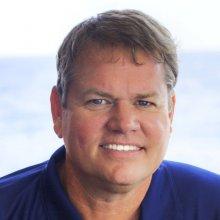
Peter Etnoyer
Tell us about your work / research. What kinds of things do you do?
I specialize in deep-sea corals because they create important habitat in the deep-sea for fishes, shrimps and crab yet these habitats are under threat from extractive activities like bottom-fishing and oil and gas development because they are poorly known and documented. There is an element of exploration and discovery in this work because the deep seafloor is very poorly mapped and explored. My team at NOAA uses submersible technologies like ROVs to explore, sample, and photo-document these habitats throughout the US. We develop new image analysis techniques to describe and compare the health and condition of these habitats, and we routinely encounter new species of deep-sea corals and sponges. Most recently we are interested in the effects of changing climate in the deep-sea, such as rising temperatures and ocean acidification.
What sparked your initial interest in your career?
My career was sparked by snorkeling and scuba diving experiences in the Florida Keys around the age of 14, but I was fond of aquaria since I was a kid and I always enjoyed the sciences. After high school I actually lost some interest in science and became engaged in the arts, particularly writing, film, and video. I regained interest after a decade or so because of my concern with decline of the oceans and overall environmental degradation. I came to learn there is much to protect, and much to explore, and we can all make a difference for a healthy ocean.
Who influenced you or encouraged you the most?
I had great support from my parents, school teachers, and swim coaches all through school. There were a few particular teachers who encouraged me to grow and to try to break the mold. Great explorers like Jacques Cousteau, Sylvia Earle, and Bob Ballard inspired me the most, and the continued success of ocean conservation organizations like World Wildlife Fund, Surfrider, and others really give me hope for the oceans.
What element of your work / study do you think is the most fascinating?
I like that we are always trying something new and and ridiculously challenging. For example, we collected a deep-sea coral with a robot on the West Coast then shipped them to alive to the laboratory on the East Coast. This was a team effort and a great accomplishment. We now know more about the biology of these corals, and this opens the door to new experiments and new challenges.
What other jobs led you to your current career?
After college, I moved to LA to work as a production and camera assistant on Hollywood feature films like 'Point Break', 'Kickboxer 2' and 'Rush'. Ten years later I went back to grad school to pursue marine environmental science, but I never abandoned my passion for cameras and technology.
What are your degrees and certifications?
Bachelor of Arts - Duke University, 1988; Master's of Coastal Environmental Management - Duke University, 2001; PhD in Coastal and Marine System Science, 2009
What are your hobbies?
I enjoy swimming and hiking in the mountains with my wife and kids, love music, and keep a growing collection of graphic novels from all over the world.
What advice would you give to someone who wants to have a career like yours?
Dedicate yourself to your pursuits, but take your time, and enjoy the opportunity that life gives you. My career trajectory was long and winding. I embraced the sciences and the arts, and then later focused on technology and production management but somehow it all came together. One thing all of these had in common is that they required dedication, teamwork, and respect.
How did you get involved in the Nautilus Exploration Program? How did you get on the ship?
My first experience was in 2006, when the Program used the NR1 submarine and Argos to run some deep-sea transects for my dissertation in the Gulf of Mexico. Years later, I joined again as a 'scientist ashore' in the Gulf of Mexico and was later invited as Chief Scientist to an expedition in Belize. This time I am aboard at the Channel Island National Marine Sanctuary to explore their deep-sea habitat.
"I am thrilled to sail aboard Nautilus because the remotely operated vehicle and ship teams are among the most talented explorers in the world."
Expeditions
Peter participated in the following Ocean Exploration Trust expeditions:
